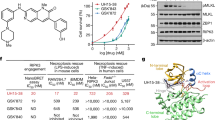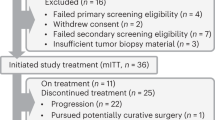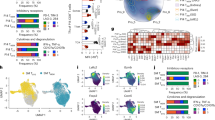Abstract
We examined cytotoxic effects of adenoviruses (Ad) expressing the p53 gene (Ad-p53) in nine human esophageal carcinoma cell lines with respect to the Ad receptor expression and the endogenous p53 gene status. Ad-p53-mediated cytotoxicity was related with an expression level of the coxsackievirus adenovirus receptor (CAR) but not with that of CD51, both of which are type 5 Ad receptors. Contrary to earlier studies, we found that the cytotoxicity was greater in tumor cells with the wild-type p53 gene than in those with mutated p53. The cytotoxic activity of Ad defective of E1B55kDa molecules (Ad-delE1B55), however, was not linked with the CAR expression level or the endogenous p53 status. We noticed that the tumor cells with the wild-type p53 gene showed greater CAR expression levels, although transduction with Ad-p53 did not upregulate the CAR expression in the mutated cells. We also examined the Ad-53-mediated cytotoxicity in two kinds of paired fibroblasts, parent and immortalized with loss of the p53 functions, and showed that the CAR expression level was more influential than the endogenous p53 status in the cytotoxicity. These data suggest that CAR expression level is a better predictive marker than endogenous p53 status for Ad-p53-mediated cytotoxicity in esophageal carcinoma.
This is a preview of subscription content, access via your institution
Access options
Subscribe to this journal
Receive 12 print issues and online access
$259.00 per year
only $21.58 per issue
Buy this article
- Purchase on Springer Link
- Instant access to full article PDF
Prices may be subject to local taxes which are calculated during checkout






Similar content being viewed by others
References
Siersema PD, van Hillegersberg R . Treatment of locally advanced esophageal cancer with surgery and chemoradiation. Curr Opin Gastroenterol 2008; 24: 535–540.
Edelman J, Edelman J, Nemunaitis J . Adenoviral p53 gene therapy in squamous cell cancer of the head and neck region. Curr Opin Mol Ther 2003; 5: 611–617.
Shimada H, Shimizu T, Ochiai T, Liu TL, Sashiyama H, Nakamura A et al. Preclinical study of adenoviral p53 gene therapy for esophageal cancer. Surg Today 2001; 31: 597–604.
Shimada H, Matsubara H, Shiratori T, Shimizu T, Miyazaki S, Okazumi S et al. Phase I/II adenoviral p53 gene therapy for chemoradiation resistant advanced esophageal squamous cell carcinoma. Cancer Sci 2006; 97: 554–561.
Senzer N, Nemunaitis J, Nemunaitis M, Lamont J, Gore M, Gabra H et al. p53 therapy in a patient with Li-Fraumeni syndrome. Mol Cancer Ther 2007; 6: 1478–1482.
Lin E, Nemunaitis J . Oncolytic viral therapies. Cancer Gene Ther 2004; 11: 643–664.
Shayakhmetov DM, Papayannopoulou T, Stamatoyannopoulos G, Lieber A . Efficient gene transfer into human CD34+ cells by a retargeted adenovirus vector. J Virol 2000; 74: 2567–2583.
Pong RC, Roark R, Ou JY, Fan J, Stanfield J, Frenkel E et al. Mechanism of increased coxsackie and adenovirus receptor gene expression and adenovirus uptake by phytoestrogen and histone deacetylase inhibitor in human bladder cancer cells and the potential clinical application. Cancer Res 2006; 66: 8822–8828.
Katayose D, Gudas J, Nguyen H, Srivastava S, Cowan KH, Seth P . Cytotoxic effects of adenovirus-mediated wild-type p53 protein expression in normal and tumor mammary epithelial cells. Clin Cancer Res 1995; 8: 889–897.
St John LS, Sauter ER, Herlyn M, Litwin S, Adler-Storthz K . Endogenous p53 gene status predicts the response of human squamous cell carcinomas to wild-type p53. Cancer Gene Ther 2000; 7: 749–756.
Clayman GL, el-Naggar AK, Roth JA, Zhang WW, Goepfert H, Taylor DL et al. In vivo molecular therapy with p53 adenovirus for microscopic residual head and neck squamous carcinoma. Cancer Res 1995; 55: 1–6.
Ko SC, Gotoh A, Thalmann GN, Zhau HE, Johnston DA, Zhang WW et al. Molecular therapy with recombinant p53 adenovirus in an androgen-independent, metastatic human prostate cancer model. Hum Gene Ther 1996; 7: 1683–1691.
Heise C, Sampson-Johannes A, Williams A, McCormick F, Von Hoff DD, Kirn DH . ONYX-015, an E1B gene-attenuated adenovirus, causes tumor-specific cytolysis and antitumoral efficacy that can be augmented by standard chemotherapeutic agents. Nat Med 1997; 3: 639–645.
Goodrum FD, Ornelles DA . p53 status does not determine outcome of E1B 55-kilodalton mutant adenovirus lytic infection. J Virol 1998; 72: 9479–9490.
O'Shea CC, Johnson L, Bagus B, Choi S, Nicholas C, Shen A et al. Late viral RNA export, rather than p53 inactivation, determines ONYX-015 tumor selectivity. Cancer Cell 2004; 6: 611–623.
Fushimi K, Iijima M, Gao C, Kondo T, Tsuji T, Hashimoto T et al. Transformation of normal human fibroblasts into immortalized cells with the mutant p53 gene and X-rays. Int J Cancer 1997; 70: 135–140.
Compton T . An immortalized human fibroblast cell line is permissive for human cytomegalovirus infection. J Virol 1993; 67: 3644–3648.
Nielsen LL, Maneval DC . p53 tumor suppressor gene therapy for cancer. Cancer Gene Ther 1998; 5: 52–63.
Quist SR, Wang-Gohrke S, Köhler T, Kreienberg R, Runnebaum IB . Cooperative effect of adenoviral p53 gene therapy and standard chemotherapy in ovarian cancer cells independent of the endogenous p53 status. Cancer Gene Ther 2004; 11: 547–554.
Tango Y, Taki M, Shirakiya Y, Ohtani S, Tokunaga N, Tsunemitsu Y et al. Late resistance to adenoviral p53-mediated apoptosis caused by decreased expression of Coxsackie-adenovirus receptors in human lung cancer cells. Cancer Sci 2004; 95: 459–463.
Asaoka K, Tada M, Sawamura Y, Ikeda J, Abe H . Dependence of efficient adenoviral gene delivery in malignant glioma cells on the expression levels of the Coxsackievirus and adenovirus receptor. J Neurosurg 2000; 92: 1002–1008.
Nemunaitis JJ, Sobol RE, Clayman G, Hamm J, Goodwin W . Evaluation of functional p53 biomarker profiles predicts efficacy of adenoviral p53 gene therapy (Advexin) in patients with recurrent squamous cells carcinoma of the head and neck (SCCHN). Mol Ther 2008; 16: S156.
Pal S, Datta K, Mukhopadhyay D . Central role of p53 on regulation of vascular permeability factor/vascular endothelial growth factor (VPF/VEGF) expression in mammary carcinoma. Cancer Res 2001; 61: 6952–6957.
Yen N, Ioannides CG, Xu K, Swisher SG, Lawrence DD, Kemp BL et al. Cellular and humoral immune responses to adenovirus and p53 protein antigens in patients following intratumoral injection of an adenovirus vector expressing wild-type p53 (Ad-p53). Cancer Gene Ther 2000; 7: 530–536.
Pong RC, Lai YJ, Chen H, Okegawa T, Frenkel E, Sagalowsky A et al. Epigenetic regulation of coxsackie and adenovirus receptor (CAR) gene promoter in urogenital cancer cells. Cancer Res 2003; 63: 8680–8686.
O'Shea CC, Soria C, Bagus B, McCormick F . Heat shock phenocopies E1B-55K late functions and selectively sensitizes refractory tumor cells to ONYX-015 oncolytic viral therapy. Cancer Cell 2005; 8: 61–74.
Brüning A, Runnebaum IB . CAR is a cell-cell adhesion protein in human cancer cells and is expressionally modulated by dexamethasone, TNFα, and TGFβ. Gene Ther 2003; 10: 198–205.
Acknowledgements
This study was partly supported by Grants-in-Aid for Scientific Research from the Ministry of Education, Culture, Sports, Science and Technology of Japan, the Grant-in-Aid for Cancer Research from the Ministry of Health, Labor and Welfare of Japan and by a Grant-in-aid from the Nichias Corporation and the Futaba Electronics Memorial Foundation.
Author information
Authors and Affiliations
Corresponding author
Rights and permissions
About this article
Cite this article
Ma, G., Kawamura, K., Li, Q. et al. Cytotoxicity of adenoviruses expressing the wild-type p53 gene to esophageal carcinoma cells is linked with the CAR expression level and indirectly with the endogenous p53 status. Cancer Gene Ther 16, 832–840 (2009). https://doi.org/10.1038/cgt.2009.21
Received:
Revised:
Accepted:
Published:
Issue Date:
DOI: https://doi.org/10.1038/cgt.2009.21
Keywords
This article is cited by
-
Cytotoxic effects of replication-competent adenoviruses on human esophageal carcinoma are enhanced by forced p53 expression
BMC Cancer (2015)
-
Combination of adenoviruses expressing melanoma differentiation-associated gene-7 and chemotherapeutic agents produces enhanced cytotoxicity on esophageal carcinoma
Cancer Gene Therapy (2014)
-
Combinatory cytotoxic effects produced by E1B-55kDa-deleted adenoviruses and chemotherapeutic agents are dependent on the agents in esophageal carcinoma
Cancer Gene Therapy (2010)



